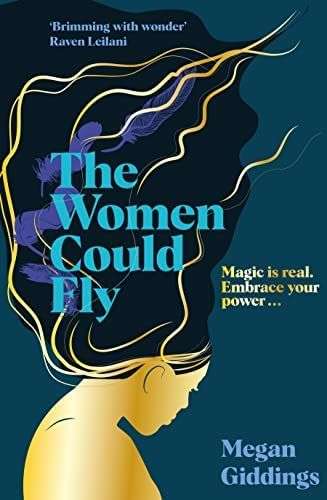We’ve implemented some new protocols around sending us messages via this website. Please email website “at” britishfantasysociety “dot” org for any issues.

For all things fantasy, horror, and speculative fiction
-
Announcement:

The Women Could Fly by Megan Giddings from @panmacmillan
The Women Could Fly by Megan Giddings
MacMillan, pb, £7.91
Reviewed by Melody Bowles

The Women Could Fly is narrated by Josephine, who lives in a world where people still accuse women of being witches. Josephine is twenty-eight years old and really ought to be married now. As she is not, she must register with the government and have a male relative sign off that she is not a witch. The deck is stacked against Josephine even further by her mother’s disappearance when she was a teenager. People have long suspected Josephine is the daughter of a witch, which might well make her one too.
This dystopian premise brings to mind the descriptions of how The Handmaid’s Tale Gilead was formed by gradually eroding women’s rights. The story’s thrust is very different, but the premises feel related. Both dystopian worlds have the view minorities are dangerous and must be crushed. The world of The Women Could Fly is more insidious, sowing suspicion and fear under the guise of keeping people safe from the almighty witches. It’s hauntingly effective.
The book’s pace picks up slowly, with a welcome twist in the middle bringing new light to the narrative. It is told from Josephine’s perspective. As a character, she is very introspective and talks about the compromises she’s made to keep herself safe. The horror is creeping and gradual before the more fantastical elements bring it to the forefront later. The imagery – for example, bird skeletons raining from the sky – is lovely and macabre.
Josephine’s relationships with her mother, father, best friend, and lovers are the cornerstones of the book. Each one is explored in intricate detail with realistic, relatable touches. The book as a whole explores how much choice one has over their identity and raises some interesting questions. Does who we are come from our parents, our friends, or the people we choose to love? Or perhaps our race, gender, or sexuality? Is identity something innate, or can we change it at will?
If you are looking for a thoughtful, feminist dystopia, The Women Could Fly is the book to choose.
Explore the blog:
Blog categories:
Latest Posts:
Tags:
#featured (56) #science fiction (25) Book Review (264) events (44) Fantasy (231) Graphic Novel (13) horror (136) Members (62) Orbit Books (48) profile (43) Romance (17) Science Fiction (50) short stories (28) Titan Books (52) TV Review (15)
All reviews
Latest Reviews:
- THE HOUSE ON THE BORDERLAND by William Hope Hodgson
- Monstrum by Lottie Mills
- Mood Swings by Dave Jeffery
- Yoke of Stars by R.B. Lemberg
- Hera by Jennifer Saint
- The Black Bird Oracle by Deborah Harkness
- RETURN OF THE DWARVES By Markus Heitz
- Delicious in Dungeon
- Toxxic by Jane Hennigan
- THIS ISLAND EARTH: 8 FEATURES FROM THE DRIVE-IN By Dale Bailey
Review tags:
#featured (2) Action (4) Adventure (4) Book Review (28) Fantasy (18) Featured (2) Feminist (2) Gothic Horror (3) Horror (14) Magic (3) Orbit Books (3) Romance (6) Science Fiction (5) Swords and Sorcery (2) Titan Books (7)